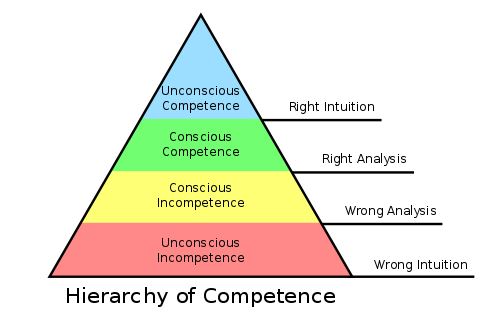Overcoming the Unconscious Incompetence Hurdle at Work

People can be either competent or incompetent, but can they be unconsciously incompetent? Yes. According to the data published in Adapting Learning, a whitepaper published by area9 Learning, people are ‘unconsciously incompetent’ in typically 20%-40% of core competencies that are critical to their performance. Although the figures primarily correspond to their clients it reveals an often underestimated issue at work. In one of the organizations where they delivered a training they found out that 22% were “unconsciously incompetent about features of a product— i.e., employees believed they knew product features when in reality they did not.” Clearly, such incompetence is a setback for any business as people don’t realise they are incompetent or lack knowledge and go on delivering tasks with partial knowledge and understanding. This is why a salesperson who is unconsciously incompetent yet thinks he knows every feature of the product he pitches is definitely a huge liability for a company.
Before we discuss how organisations can tackle this ‘unconsciously incompetent’ phenomenon, let’s first understand what exactly it is.
In psychology, there exists a ‘conscious competence’ learning model. According to Wikipedia (the image below is sourced from there), this learning model “suggests that individuals are initially unaware of how little they know, or unconscious of their incompetence. As they recognize their incompetence, they consciously acquire a skill, then consciously use it. Eventually, the skill can be utilized without it being consciously thought through: the individual is said to have then acquired unconscious competence.”

So technically, an unconsciously incompetent person is someone who doesn’t recognise they are doing something wrong and hence go on doing it. For them to unleash their full potential they must first admit to this incompetence and begin seeing the advantages of acquiring new skills. As an employer, you can play an important role in filling this competency gap that can cost you a good deal.
Say NO to blanket training
It is high time you realise that one size DOES NOT fit all. Every employee has individual needs and it is wrong to give everyone a blanket training. What’s the point in assuming that the online training employees take is sufficient to keep them abreast with industry standards? Most time employees think of such trainings as a waste of time, especially since they think they already know it all. Your responsibility is to acknowledge every individual as different from another. After all everyone comes with different experiences, background, and knowledge.
Give customised training
Inject new material in e-courses or online training employees take. While they are likely to whizz past static content they will definitely stop at something that is difficult, new or challenging. Ideally, you should keep each employee in mind and seek help from organisations that hold expertise in crafting training content. This is an investment that will help you improve your own company’s financial performance.
Encourage a culture of learning
This knowledge gap can be filled by creating a culture of learning. When you motivate employees that the only road to success is learning they will definitely pay heed to it. But, for that to happen the measures discussed above must be executed. Tell them that no amount of pretending that they ‘know-it-all’ is going to further their career graph. It is better to admit not knowing something than faking knowing everything. That’s the only way unconscious incompetence which is so rampant in organisations can be tackled.
Whether you are a part of an industry that requires constant upskilling or not, it is important you recognise unconsciously incompetent staff. Give them a chance to learn and grow because in the end it benefits both parties.













